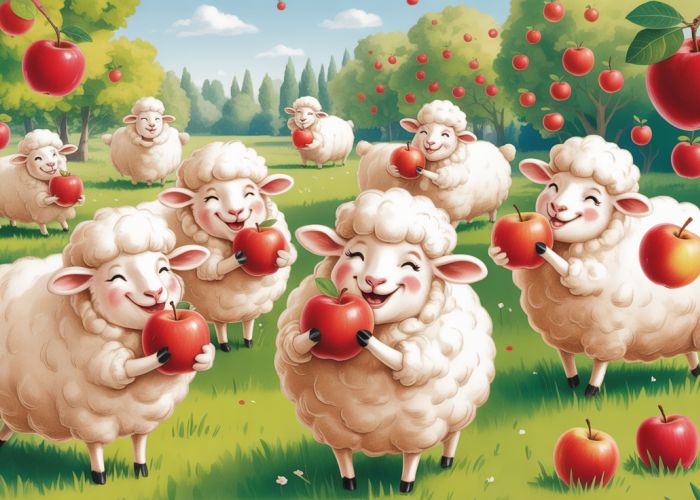The nutritional needs of sheep, grazing livestock managed by the American Sheep Industry Association, are primarily met through forages like grass and hay. While typically not part of their standard diet, sheep eat apples under specific circumstances. The palatability of these fruits, often grown in orchards utilizing integrated pest management techniques, sometimes leads to inquisitive sheep sampling them. Thus, the question of whether sheep eat apples necessitates a closer examination of their dietary flexibility.

Decoding the Sheepish Appetite: Can Sheep Eat Apples?
The question of whether "sheep eat apples" often sparks curiosity. While not their primary food source, apples can be part of a sheep’s diet under certain circumstances. Understanding the specifics of sheep nutrition and the potential benefits and risks of apples is crucial for responsible sheep owners.
Understanding Basic Sheep Nutrition
Before exploring the role of apples, it’s essential to grasp the foundational dietary needs of sheep.
Primary Forage Requirements
- Sheep are herbivores, primarily grazing animals. Their digestive systems are optimized for processing grasses, legumes, and other fibrous plants.
- The bulk of their diet should consist of high-quality pasture or hay.
- Nutritional requirements vary depending on breed, age, stage of production (e.g., pregnancy, lactation), and overall health.
The Ruminant Advantage
- Sheep are ruminants, meaning they possess a multi-chambered stomach that allows them to efficiently digest plant material.
- This digestive process involves microbial fermentation, breaking down cellulose and other complex carbohydrates into usable energy.
Apples as a Supplementary Food Source
While grass and hay are the cornerstones of a sheep’s diet, apples can serve as a supplementary or occasional treat.
Nutritional Value of Apples for Sheep
- Apples offer vitamins (such as Vitamin C), minerals, and carbohydrates (sugars) that can contribute to a balanced diet in moderation.
- They provide a source of quick energy, especially useful for ewes during late pregnancy or lactation.
- Fiber content contributes to digestive health if not over-consumed.
Responsible Apple Introduction
Introducing apples into a sheep’s diet requires careful consideration.
- Gradual Introduction: Start with small amounts to allow the sheep’s digestive system to adjust. Sudden changes can lead to digestive upset.
- Chopping or Slicing: To prevent choking, especially in lambs or smaller breeds, always chop apples into manageable pieces.
- Moderation is Key: Apples should only constitute a small percentage of the overall diet. Overconsumption can lead to various health problems.
- Sugar Overload: The high sugar content in apples can lead to obesity and metabolic disorders if fed excessively.
- Digestive Issues: Too many apples can disrupt the rumen’s delicate balance, leading to bloat, acidosis, or diarrhea.
Potential Risks and Precautions
Despite the potential benefits, feeding apples to sheep carries some risks that must be mitigated.
Pesticide Contamination
- Conventionally grown apples are often treated with pesticides. Washing thoroughly is insufficient; organic apples are a safer option.
- Always verify the source of apples to minimize pesticide exposure.
Choking Hazard
- As mentioned previously, whole apples pose a significant choking risk.
- Proper preparation (chopping or slicing) is essential, especially for young or smaller sheep.
Rotting Fruit
- Never feed sheep rotten or moldy apples. These can contain harmful toxins that can cause serious illness or even death.
- Ensure that apples are fresh and free from blemishes before feeding.
Seeds and Core Concerns
- Apple seeds contain small amounts of cyanide. While the quantity is usually minimal, excessive consumption of seeds should be avoided.
- Removing the core minimizes this risk.
When Apples Might Be Beneficial
Certain situations may warrant the inclusion of apples in a sheep’s diet, provided the above precautions are followed.
- Treats for Training: Apples can be used as positive reinforcement during training.
- Supplementation During Cold Weather: The sugar content can provide a boost of energy during cold periods.
- Encouraging Medication Intake: Doses of liquid medicine can be poured over the top of an apple for easier consumption by the sheep.
A Quick Reference Table for Apple Feeding
| Aspect | Recommendation |
|---|---|
| Quantity | Small, occasional treat; limited to a very small percentage of daily intake |
| Preparation | Chop or slice into small, manageable pieces |
| Apple Quality | Fresh, unblemished, preferably organic |
| Frequency | Infrequent; avoid daily feeding |
| Sheep Age/Size | Adjust portion sizes accordingly; smaller sheep require even smaller portions |
| Monitoring | Observe sheep for any signs of digestive upset after feeding |
Sheep and Apples: Your Burning Questions Answered
Here are some frequently asked questions to clarify the surprising truth about sheep eating apples!
Are apples a natural part of a sheep’s diet?
No, apples are not a natural part of a sheep’s diet. Sheep are primarily grazing animals, designed to eat grasses and forage. While they can eat apples, it’s not something they’d typically encounter in a natural pasture.
Is it safe for sheep to eat apples?
In moderation, yes. A few slices of apple can be a tasty treat for sheep. However, large quantities can lead to digestive upset and even bloat, which can be dangerous. Always remove seeds as they contain cyanide.
Why would a sheep eat apples if they prefer grass?
Sheep are curious animals and might sample apples if they are available. Sweetness can be appealing. However, it’s more likely they’ll only eat apples if other forage is scarce or if the apples are offered to them. It’s not their first choice.
What are the potential risks of feeding sheep apples?
Overfeeding apples can lead to digestive problems like bloat or diarrhea. Apples are also high in sugar, which can contribute to health issues like obesity and metabolic problems if fed too often. Remember, moderation is key if you consider allowing sheep eat apples.
So, there you have it – the surprising truth about whether sheep eat apples! Hopefully, you now have a better understanding of their diet. Happy farming!